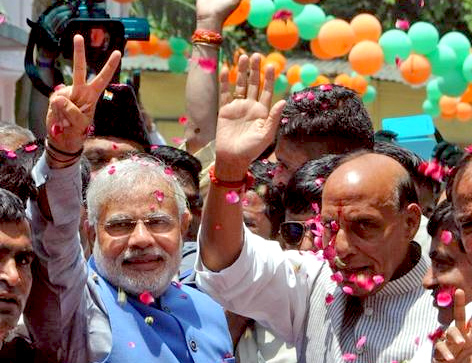 New Delhi, May 17: The BJP Parliamentary Party will meet on May 20 to formally elect Narendra Modi as its leader, a formality before his anointment as Prime Minister.
New Delhi, May 17: The BJP Parliamentary Party will meet on May 20 to formally elect Narendra Modi as its leader, a formality before his anointment as Prime Minister.
This was decided a meeting of the Parliamentary Board, the highest decision-making body of the party chaired by BJP chief Rajnath Singh and attended by Modi, L K Advani, Murli Manohar Joshi, Sushma Swaraj and other top leaders.
In a brief address to the media, Rajnath Singh said the NDA allies will also be invited for a meeting on the same day.
Dismissing media speculation, he said no date has been fixed for swearing-in of Modi as the Prime Minister. It will be decided after the Parliamentary Party meeting.
Singh was addressing media along with Modi, L K Advani and other top leaders after over one-hour meeting of Parliamentary Board which adopted a resolution applauding the stewardship of its Prime Ministerial candidate for his "tireless efforts" and "inspirational" leadership.
The resolution said Modi "gave a direction to the campaign with a vision" and also thanked BJP workers along with "social and cultural organisations", an apparent reference to RSS and affiliate groups.
It underlined that India needs a government which is "effectively governed and puts the country on a high growth track and sets highest standards of probity."
The BJP wants to build a country which is "strong, self-respecting and self-reliant", the resolution said.
Commenting on the election results, the Board hailed the verdict given by people. "People have spoken and spoken decisiviely. It is for the first time that a non-Congress government has got mandate on its own to govern."





Comments
Add new comment